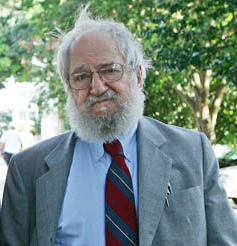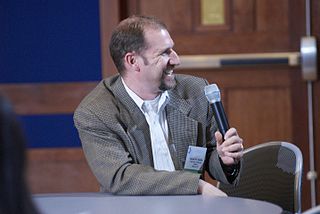Educational software is a term used for any computer software which is made for an educational purpose. It encompasses different ranges from language learning software to classroom management software to reference software. The purpose of all this software is to make some part of education more effective and efficient.
Educational games are games explicitly designed with educational purposes, or which have incidental or secondary educational value. All types of games may be used in an educational environment, however educational games are games that are designed to help people learn about certain subjects, expand concepts, reinforce development, understand a historical event or culture, or assist them in learning a skill as they play. Game types include board, card, and video games.
StarLogo is an agent-based simulation language developed by Mitchel Resnick, Eric Klopfer, and others at the Massachusetts Institute of Technology (MIT) Media Lab and Scheller Teacher Education Program in Massachusetts. It is an extension of the Logo programming language, a dialect of Lisp. Designed for education, StarLogo can be used by students to model or simulate the behavior of decentralized systems.

Katie Salen Tekinbas is an American game designer, animator, and educator. She is a professor at the University of California, Irvine. Previously, she taught at DePaul University College of Computing and Digital Media, Parsons The New School for Design the University of Texas at Austin, New York University, and the Rhode Island School of Design. She has an MFA in graphic design from the Rhode Island School of Design.
A learning management system (LMS) is a software application for the administration, documentation, tracking, reporting, automation, and delivery of educational courses, training programs, materials or learning and development programs. The learning management system concept emerged directly from e-Learning. Learning management systems make up the largest segment of the learning system market. The first introduction of the LMS was in the late 1990s. Learning management systems have faced a massive growth in usage due to the emphasis on remote learning during the COVID-19 pandemic.
Educational technology is the combined use of computer hardware, software, and educational theory and practice to facilitate learning. When referred to with its abbreviation, edtech, it often refers to the industry of companies that create educational technology.

Constructionist learning is the creation by learners of mental models to understand the world around them. Constructionism advocates student-centered, discovery learning where students use what they already know, to acquire more knowledge. Students learn through participation in project-based learning where they make connections between different ideas and areas of knowledge facilitated by the teacher through coaching rather than using lectures or step-by-step guidance. Further, constructionism holds that learning can happen most effectively when people are active in making tangible objects in the real world. In this sense, constructionism is connected with experiential learning and builds on Jean Piaget's epistemological theory of constructivism.

Mitchel Resnick is LEGO Papert Professor of Learning Research, Director of the Okawa Center, and Director of the Lifelong Kindergarten group at the Massachusetts Institute of Technology (MIT) Media Lab. As of 2019, Resnick serves as head of the Media Arts and Sciences academic program, which grants master's degrees and Ph.D.s at the MIT Media Lab.

Idit R. Harel is an Israeli-American entrepreneur and CEO of Globaloria. She is a learning sciences researcher and pioneer of Constructionist learning-based EdTech interventions.
Augmented learning is an on-demand learning technique where the environment adapts to the learner. By providing remediation on-demand, learners can gain greater understanding of a topic while stimulating discovery and learning.

A virtual learning environment (VLE) is a system that creates an environment designed to facilitate teachers' management of educational courses for their students, especially a system using computer hardware and software that involves distance learning. In North America, a virtual learning environment is often referred to as a "learning management system" (LMS).

MIT App Inventor is a web application integrated development environment originally provided by Google, and now maintained by the Massachusetts Institute of Technology (MIT). It allows newcomers to computer programming to create application software (apps) for two operating systems (OS): Android and iOS, which, as of 20 January 2023, is in final beta testing. It is free and open-source software released under dual licensing: a Creative Commons Attribution ShareAlike 3.0 Unported license and an Apache License 2.0 for the source code.

John Clifford Mitchell is professor of computer science and electrical engineering at Stanford University. He has published in the area of programming language theory and computer security.

David Williamson Shaffer is the Vilas Distinguished Achievement Professor of Learning Science at the University of Wisconsin–Madison in the department of Educational Psychology, the Obel Foundation Professor of Learning Analytics at Aalborg University in Copenhagen, a Data Philosopher at the Wisconsin Center for Education Research, and Principal of EFGames, LLC.

edX is an American massive open online course (MOOC) provider created by Harvard and MIT. It hosts online university-level courses in a wide range of disciplines to a worldwide student body, including some courses at no charge. It also conducts research into learning based on how people use its platform. edX runs on the free Open edX open-source software platform. 2U is the parent company, with edX operating as its global online learning platform and primary brand for products and services.
MITx is the massive open online course (MOOC) program at Massachusetts Institute of Technology. A constituent program of MIT's Office of Digital Learning, MITx produces MOOCs from MIT departments and faculty. Prior to 2U's acquisition of edX, MITx courses appeared there. After the acquisition, courses appeared on MIT's own site. MITx also supports residential experiments with scalable learning technologies and research on digital learning. MOOCs offered through edX by MITx are open-enrollment and free to take. In September 2012, edX and MITx introduced the option to receive an ID verified certificate on some courses.
Games and learning is a field of education research that studies what is learned by playing video games, and how the design principles, data and communities of video game play can be used to develop new learning environments. Video games create new social and cultural worlds – worlds that help people learn by integrating thinking, social interaction, and technology, all in service of doing things they care about. Computers and other technologies have already changed the way students learn. Integrating games into education has the potential to create new and more powerful ways to learn in schools, communities and workplaces. Games and learning researchers study how the social and collaborative aspects of video game play can create new kinds of learning communities. Researchers also study how the data generated by game play can be used to design the next generation of learning assessments.

Natalie Rusk is a research scientist in the Lifelong Kindergarten (LLK) group, part of the MIT Media Lab at the Massachusetts Institute of Technology.
Language MOOCs are web-based online courses freely accessible for a limited period of time, created for those interested in developing their skills in a foreign language. As Sokolik (2014) states, enrolment is large, free and not restricted to students by age or geographic location. They have to follow the format of a course, i.e., include a syllabus and schedule and offer the guidance of one or several instructors. The MOOCs are not so new, since courses with such characteristics had been available online for quite a lot of time before Dave Cormier coined the term 'MOOC' in 2008. Furthermore, MOOCs are generally regarded as the natural evolution of OERs, which are freely accessible materials used in Education for teaching, learning and assessment.
Virtual exchange is an instructional approach or practice for language learning. It broadly refers to the "notion of 'connecting' language learners in pedagogically structured interaction and collaboration" through computer-mediated communication for the purpose of improving their language skills, intercultural communicative competence, and digital literacies. Although it proliferated with the advance of the internet and web 2.0 technologies in the 1990s, its roots can be traced to learning networks pioneered by Célestin Freinet in 1920s and, according to Dooly, even earlier in Jardine's work with collaborative writing at the University of Glasgow at the end of the 17th to the early 18th century.









